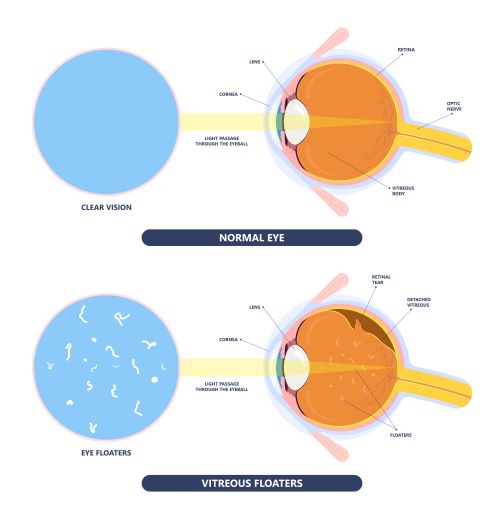Flashes and floaters are painless phenomena caused by the shrinking of the eye’s vitreous (the gel-like fluid in between the lens and the retina) that occurs due to aging. They are common in adults over the age of 50. Flashes look like lightning or camera flashes, whereas floaters appear in your field of vision as opaque specks. Although these sensations appear to occur outside of the eye, they are actually happening within the eye. Both flashes and floaters are common; however, the sudden onset of many flashes and floaters can be a sign of a retinal detachment.

Flashes
When the vitreous rubs or pulls on the retina, you might experience flashes. Flashes can look like bright spots or lightning strikes in your field of vision. These can occur off and on for weeks or months and are commonly reported to occur first thing in the morning or in dark rooms. Flashes are common as you age, because as the vitreous shrinks over time it pulls on the retina.
Floaters
As you age and the vitreous begins to shrink, small gel-like particles called floaters are solidified and drift through the vitreous. As they move, they can cross in front of the macula, allowing you to see them. Floaters are specks of opaque dots or lines you see in your field of vision. Often you can notice them when staring at a blank wall, and they seemingly move with your vision wherever you look. In addition to age, you might experience floaters as a result of diabetic retinopathy or inflammation of the eye (uveitis).
Since your eyes don’t necessarily age at the same rate, you might experience flashes or floaters in one eye and not in the other. This is common, and in general, flashes and floaters are common. However, the sudden onset of many flashes and floaters is not. A tell-tale sign of a retinal tear or detachment is a sudden increase in the number of flashers and floaters in your field of vision and any shadows or “curtains” in your peripheral vision. To determine if your visual symptoms are serious, call our office at 954-772-3337 to schedule a consultation with one of our board-certified retina specialists, Dr. Burgess, Dr. Lara, or Dr. Villate.






